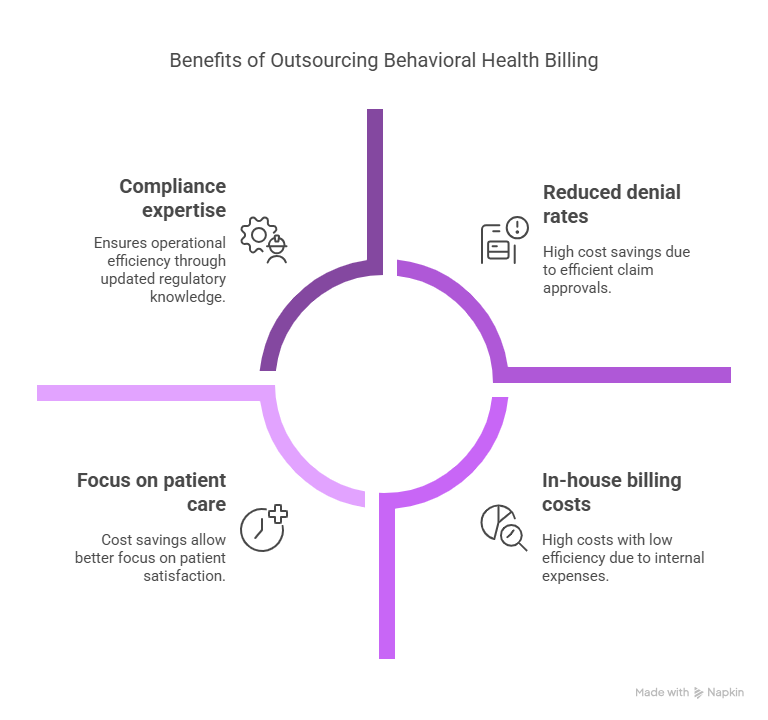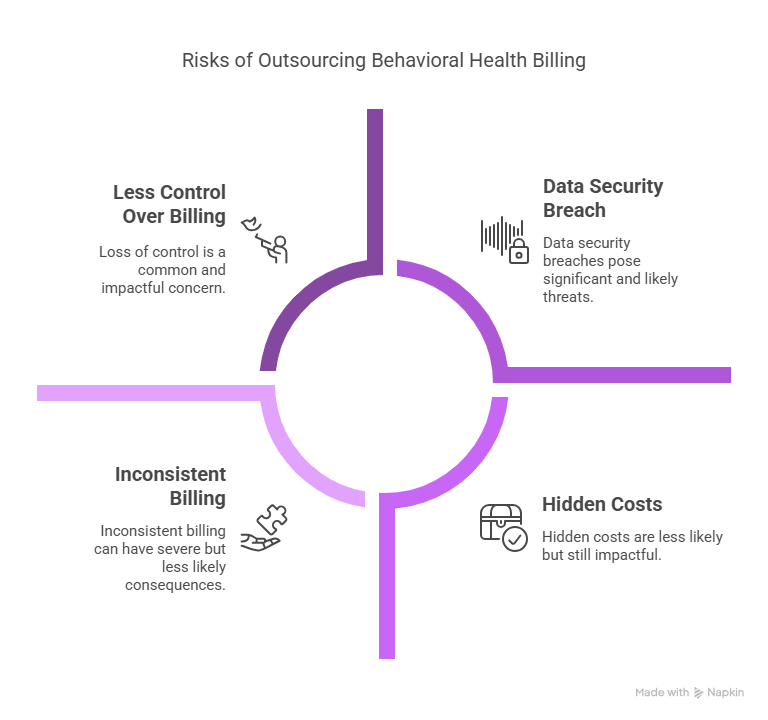Outsourcing Behavioral Health Billing Service: Pros & Cons
12 May 2025 By: Mary Dellosa
Updated

Outsourcing behavioral health billing means hiring a specialized billing partner to handle claims, coding, insurance verification, and follow-ups for mental health and substance use services. The main benefits are faster reimbursements, fewer denials, and less admin work for your team. The main downsides are less day-to-day control, potential data security risks, and possible extra fees. For example, outsourcing can reduce coding errors, but you should confirm HIPAA safeguards and pricing upfront.
Understanding Behavioral Health Billing Service
Behavioral health billing covers claims for mental health and substance use care. It includes checking insurance, coding services, and tracking unpaid claims. Unique rules and policy differences make it vital for providers to know the billing process well.
The Complexity of Behavioral Health Billing Service
Behavioral health billing goes beyond payment collection. It involves rules, insurance demands, and strict coding. Providers must understand how Medicare, Medicaid, and private insurers work. Each payer follows different rules for coverage and pay. Mental health laws and policies also change often, so billing teams must stay sharp.
This complexity adds pressure on providers. Many, especially small practices, struggle with the workload. Billing needs expert knowledge of CPT and ICD codes. Mistakes in coding can cause denied claims, delays, and lost money.
Telehealth adds new billing hurdles. Remote care across states brings different rules. Providers must follow both state and federal billing laws. To keep up, they need smart systems and ongoing training. This lets them stay paid and keep patient care first.
The Pros of Outsourcing Behavioral Health Billing Service
Outsourcing behavioral health billing brings big gains in speed and cost control. Here’s how it helps:

1. Cuts Costs
Running billing in-house costs money—staff, tools, and training add up. Outsourcing turns these into flexible costs. You only pay for what you use.
Billing firms know the system well. They work faster and make fewer errors. Claims get approved quicker, and denial rates drop. That boosts cash flow.
Outsourcing also lowers the risk of expensive mistakes. They use smart tools to track trends and fix billing issues fast. Most small practices can’t afford such tech or support.
2. Access to Expertise
Rules and insurance demands change often. Outsourcing teams stay updated and ensure compliance. This lowers audit risks and keeps the practice safe.
3. Focus on Patient Care
Outsourcing billing frees providers to focus on patients, not paperwork. This improves care and boosts patient satisfaction.
With fewer admin tasks, providers feel less stressed and more motivated. This lifts the mood for staff and patients alike.
Extra time lets providers grow their skills, test new treatments, or connect with the community. These steps build trust and support better mental health care.
The Cons of Outsourcing Behavioral Health Billing Service
Outsourcing billing has some risks to consider:

1. Less Control
Handing off billing means losing daily oversight. This can raise worries about service quality. It also makes communication harder. Without direct contact, fixing problems may take longer. That can slow the billing process.
Inconsistent billing can confuse patients and hurt their trust. Practices might need to spend time checking the work, cutting into the benefits of outsourcing.
2. Data Security Concerns
Data security is a key concern when outsourcing billing. Behavioral health data is sensitive and must be protected.
Firms must follow HIPAA rules and use strong security tools. A breach can lead to fines, lawsuits, and lost trust. A leak may also hurt the practice’s name and scare away patients. Before hiring a billing firm, check their security steps and breach plans.
3. Potential for Hidden Costs
To avoid surprises, ask for a full cost breakdown. Talk openly about all fees and try to set price limits or tie fees to results. Think long term, savings fade if service falls short or extra costs pop up often. Careful planning helps keep outsourcing a smart choice.
Making the Decision: Factors to Consider
Choosing to outsource behavioral health billing is a big step. Think about these key points:
1. Practice Size and Needs
Small practices often gain the most from outsourcing. It saves them from hiring and training a billing team. Larger groups may want to keep billing in-house for control. But complex rules and insurance demands can still strain their staff.
Outsourcing lifts that load, letting providers focus on care. It brings expert help to handle tough billing tasks with ease.
2. Current Billing Challenges
Check your billing issues before choosing to outsource. Signs like high denial rates, slow payments, or staff burnout may show it’s time for help. Outsourcing can help boosts cash flow and eases stress.
But if your billing runs well, you may not need to outsource. First, audit your system to find weak spots. Then decide if outside help is needed.
3. Long-Term Goals
Think about long-term goals before outsourcing. If you plan to grow, outsourcing adds scale without hiring more staff.
But if personal service matters most, in-house billing may suit better. Billing affects patient trust, so clear communication is key.
Trending Now
In 2025, mental health billing faces rising claim denials due to complex rules, evolving CPT codes, and tight insurance policies. Common issues include missing prior authorizations, coding errors, unverified coverage, and late claim filing. These problems hurt revenue and frustrate staff. To prevent denials, practices must verify insurance in real time, train staff, use AI claim scrubbers, and document thoroughly. Outsourcing can also ease the burden and improve cash flow. With the right tools and training, providers can protect their revenue and focus more on patient care.
Conclusion: Weighing the Options
Outsourcing behavioral health billing has pros and cons. It can save money, boost focus on care, and offer expert help. But it may bring risks like lost control, data threats, and surprise fees. Each practice must weigh its own needs and goals. The right choice improves billing without hurting care.
In a fast-changing field, staying flexible is key. Whether billing stays in-house or goes outside, the goal stays the same, great care for every patient.
As you consider the pros and cons of outsourcing behavioral health billing, remember that operational efficiency is key to maintaining a focus on patient care. HelpSquad Health is here to streamline your administrative workload with our virtual assistants and 24/7 customer service team. Starting at just $8.50 per hour, our healthcare virtual assistants are ready to support your practice’s needs. Start Trial today and experience the difference that professional outsourcing services can make for your organization.


